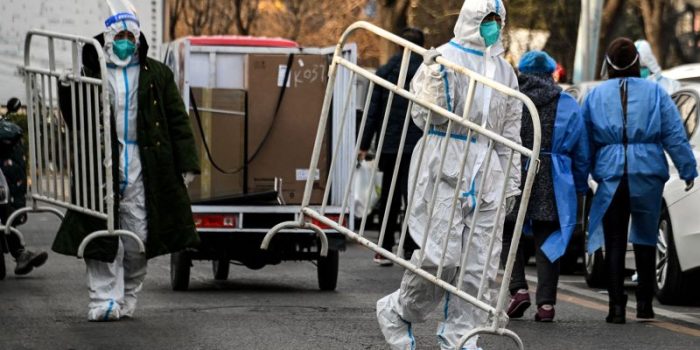Editor’s Note: Lars Hamer is the Editor-in-Chief of the China lifestyle magazine, That’s. He has lived in Guangzhou, China since 2018. The views expressed in this commentary are his own. Follow him on Twitter @LarsHamer1. Read more opinion on CNN.
Guangzhou
CNN
—
It’s the knock every resident here dreads. Early Tuesday morning, a sudden loud banging at the door of my apartment in the southern Chinese city of Guangzhou. Instantly, fear washed over me; health care workers in hazmat suits were ordering everyone to go downstairs because a neighbor had tested positive for Covid-19.
I had good reason to worry. Just one month ago, a teacher friend of mine and his colleagues were sent to centralized quarantine after one student at his school tested positive for Covid-19. I feared the same was about to happen to me.
To my surprise, nothing of the sort. I took a Covid-19 test and underwhelmingly, that was it. Before my result even came out, I was free to leave my house and go about my day, totally unrestricted.
If this had occurred just weeks before, I would have, like my friend, been labeled a “close contact” and therefore would have been powerless to avoid the quarantine facility’s vice-like grip.
Almost overnight, Guangzhou, a city of some 15 million people, has been transformed from a Covid-19 ghost town back to the bustling metropolis I first encountered when I moved here five years ago.
The Chinese government never officially acknowledged the anti-zero-Covid protests that erupted following a fire that killed at least 10 people in an apartment block in Urumqi last month. But it’s hard not to see the recent overhaul of the national pandemic response as a subtle acknowledgment that mistakes were made.
Just look at the new measure forbidding the blocking of fire exits in the event of a lockdown, for example. Now, people who are infected can isolate themselves at home. Quarantine facilities are soon to be a thing of the past.
It all feels like a light at the end of what has been a very long tunnel. Scanning QR codes every time I entered a building, daily tests, and the constant thought that I could be sent to a quarantine facility for being a “secondary close contact” (being near someone who has interacted with a positive case), have all dominated the majority of my time in China.
I haven’t seen my family in Sheffield, England, for three years, and countless friends have left China after growing tired of jumping through Covid-shaped hoops. For the past two months, Guangzhou has been dealing with its “most complicated outbreak ever,” as transmission of the virus continued despite lockdown measures.
I spent most days working until late at night because it was the only thing to do; non-essential businesses had closed, and millions of people were confined to their homes. I too began to feel the strain and started considering leaving the country.
Then, in the space of just a few days, this world of restrictions was quite literally dismantled. On November 30, the Covid-19 testing sites that for so long had dictated our movements were all closed. Soon after, it was announced that lockdowns would only be allowed in “high-risk areas,” allowing businesses outside those areas to resume. Furthermore, a Covid-19 test would no longer be required to enter them.
It was a moment of pure disbelief. Guangzhou had almost 8,000 cases that day, numbers similar to those that triggered a city-wide lockdown in Shanghai in April.
Over the next few days, the Guangzhou I came to in 2018 was almost back to normal. The streets were lined with people. Friends and families who had not seen each other for months gathered in bars and restaurants, and QR codes were being ripped down from walls; our movements no longer tracked.
Even with the new pandemic strategy, some restrictive measures remain. But there’s little doubt the fight against Covid-19 has entered a new stage.
For three years, the Chinese government has taught its citizens to fear the virus and that hiding behind lockdowns is the only way forward. Now, as the country rolls back lockdowns and stops testing its citizens so stringently, the number of infections is almost certain to hit unprecedented levels.
State media have already begun trying to change everyone’s thinking by downplaying the lethality of the Omicron variant. At the same time, a huge drive to vaccinate the elderly is underway.
But what if China’s vaccines, whose efficacy has been questioned, and the suggested medicines don’t work to the desired effect? What if the likely spike in infections is coupled with a rise in deaths? Already, some are wondering how many Covid-19 deaths protesters will accept.
What is certain is that China is currently on the road toward living with the virus, one that the rest of the world took two years ago.
Sumber: www.cnn.com
